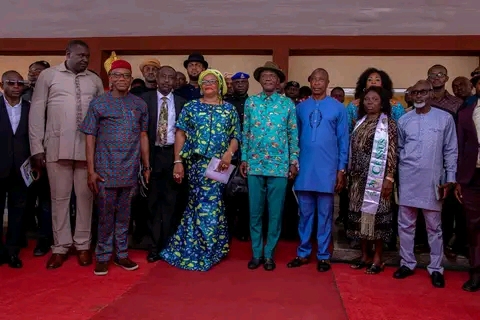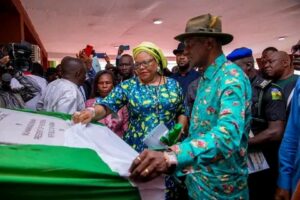Niger Delta
Bayelsa To Undertake Quick-Win Projects

Bayelsa State Government is to undertake some quick-win projects across the various constituencies of the State, alongside the ongoing big ticket projects to fast-track development in the state.
The State Deputy Governor, Senator Lawrence Ewhrudjakpo, stated this at a meeting with key stakeholders in Brass Constituencies 1, 2 and 3, in Government House, Yenagoa.
According to a statement by his Senior Special Assistant on Media, Mr Doubara Atasi, the Deputy Governor explained that the essence of the interaction was to assess the areas of their needs to enable government address such challenges.
He said while the Prosperity Administration was handling the construction of key projects such as the three senatorial roads, it has become imperative to also provide immediate interventions in projects that would impact directly on the people across communities.
Senator Ewhrudjakpo, who charged Chairmen of Community Development Committees (CDC) in the constituencies to work closely with other community leaders, charged them to take responsibility of ensuring peace and stability in their domains.

Bayelsa State Deputy Governor, Senator Lawrence Ewhrudjakpo During The Commissioning Of The Federal Secretariat Complex In Yenagoa
Reacting to issues of lack of teachers in schools in the communities, the Deputy Governor called on the CDC chairmen to work with other stakeholders to monitor schools and submit a monthly report to his office and the Ministry of Education about teachers who fail to report at their duty posts.
He stressed that henceforth, teachers posted to community schools who abandon their duty posts would face disciplinary measures.
On ocean surge and erosion affecting most communities, Senator Ewhrudjakpo said the problem was beyond the State Government and would require the collaborative efforts of the Federal Government to tackle the situation.
He also directed that a delegation led by the Commissioner for Health, Dr Pabara Igwele, should visit Ewoama Community within the week to ascertain the status of the health facility there and come up with a report.
Speaker of the State House of Assembly, Rt.Hon. Abraham Ingobere, lauded the State Government’s decision to get first hand information from the people about their challenges, saying it was the first of its kind.
Rt. Hon Ingobere, who acknowledged that the present administration had worked hard particularly in infrastructure development, however, noted that communities needed a fair spread of government projects.
The speaker also identified lack of security, internal roads, town halls, pipe borne water, electricity supply and health centres as major problems bedeviling the people.
In her remarks, Chairman, Bayelsa State Science and Technology Board, Prof. Ayibaemi Spiff, traced the lack of teachers, particularly science-based ones, to the absence of accommodation and incentives.
She, therefore, urged the State Government to make concerted efforts to enhance teachers’ welfare.
In their separate remarks, the various stakeholders, including the political class and CDC chairmen from the three constituencies, lamented absenteeism on the part of teachers and health workers in most of their communities.
Their requests ranged from provision of landing jetties, electricity, construction of link roads, health and school infrastructure, police stations, lodges for teachers and youth corps members to the construction of shoreline protection in Odioma and other coastal communities in the area against ocean encroachment.
Some government officials who made submissions at the meeting included, the Member representing Brass Constituency 1 at the State House of Assembly, Hon Charles Daniel: Commissioner for Mineral Resources, Dr Ebieri Jones: Special Duties (East), Hon. Preye Broderick: and their Lands and Survey counterpart, Hon. Andrew Esau.
Others were the Governor’s Special Representative in Brass LGA, Hon Bemoye Pogonyo: a member, Local Government Service Commission, Hon Uroh Kian: and the Acting Caucus Chairman of the Peoples Democratic Party (PDP) in Brass, His Royal Highness Moses Kenibara.
By: Ariwera Ibibo-Howells,
Yenagoa
Niger Delta
Oborevwori Launches Medical Outreach For Children With Special Needs

Niger Delta
UniCal Commits To Nursing Education Dev In C’River

Niger Delta
Agency Demolishes Illegal Roadside Structures In Delta N8 by … Clears Street Traders


